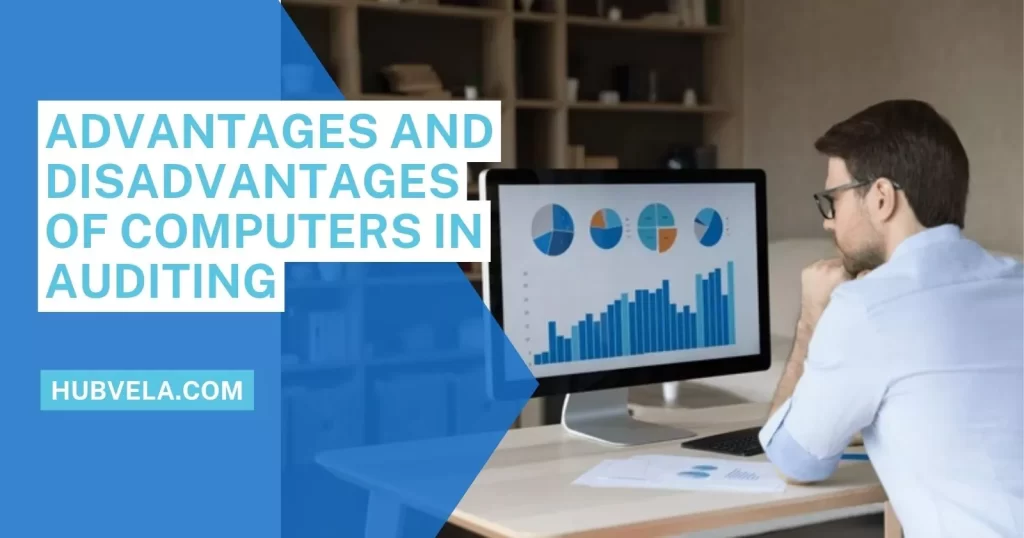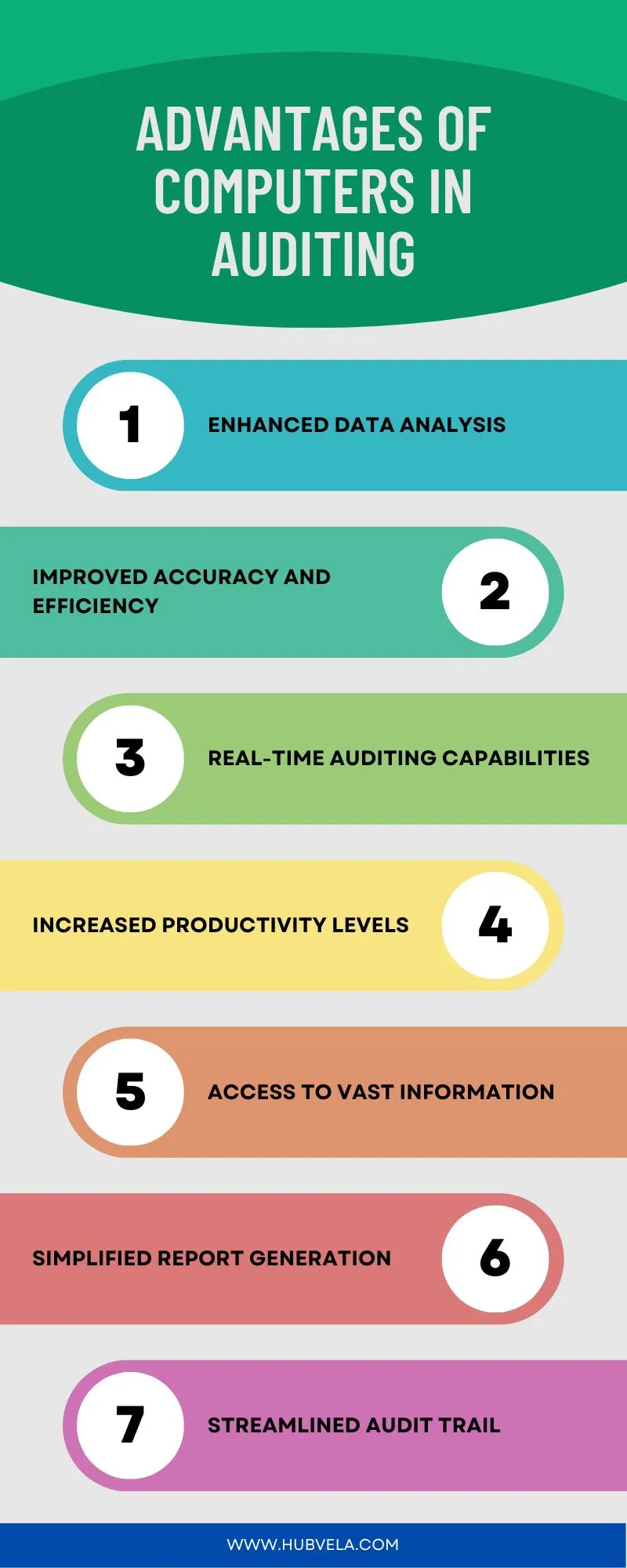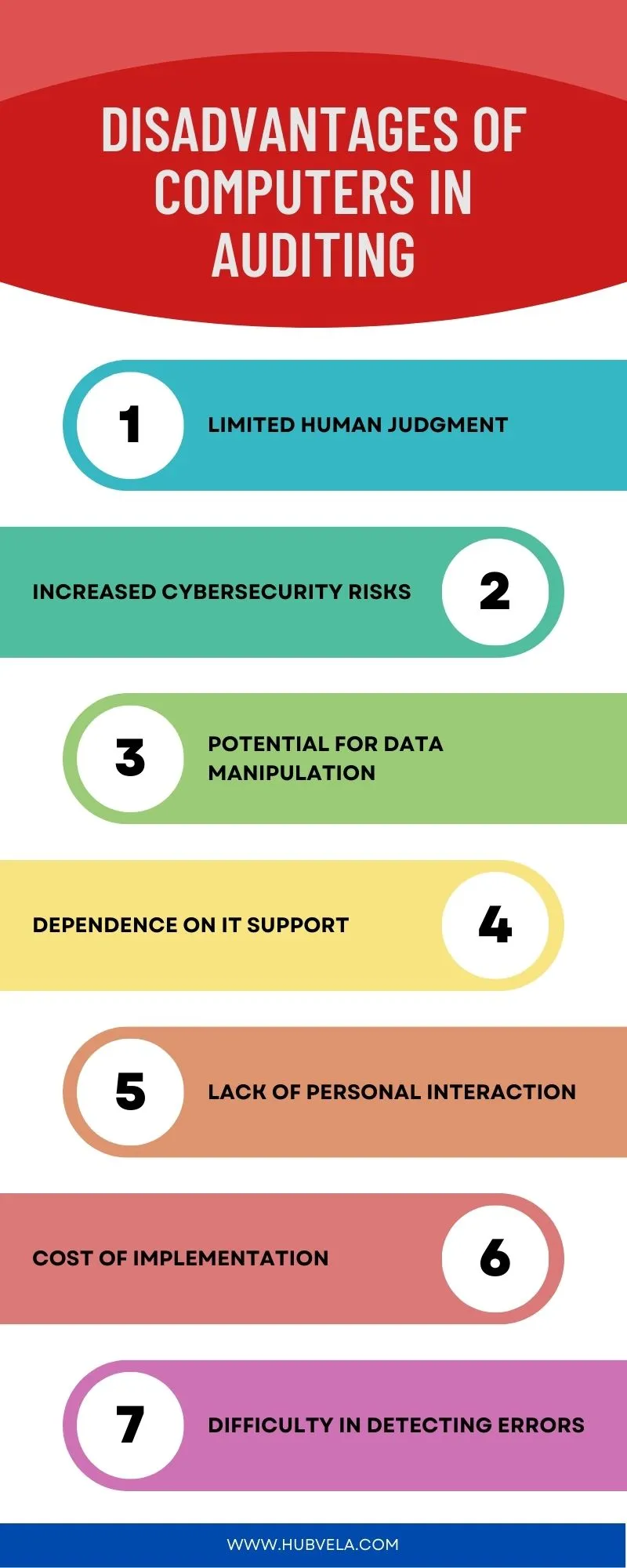Are you curious about the advantages and disadvantages of using computers in auditing? Well, look no further!
Computers have revolutionized the auditing process, bringing with them a plethora of benefits and drawbacks. From enhanced data analysis to real-time auditing capabilities, computers have made auditing more efficient and accurate.
However, there are also downsides, such as the lack of personal interaction and the cost of implementation. Detecting errors can also be challenging in a computerized auditing system.
In this article, we will delve into the advantages and disadvantages of computers in auditing, providing you with a comprehensive understanding of this technology’s impact on the auditing profession. So, let’s dive in and explore this fascinating topic together!

--Advertisement--
Advantages of Computers in Auditing
The use of computers in auditing has significantly improved the efficiency and accuracy of the audit process. Some of the key advantages of using computerized accounting software and audit tools include:

1. Enhanced Data Analysis
One advantage of computers in auditing is the ability to enhance data analysis. With the advancement of technology, auditors can now employ sophisticated data analytics tools to analyze large volumes of data quickly and accurately. These tools enable auditors to identify patterns, trends, and anomalies in the data, allowing for a more comprehensive and in-depth analysis.
Additionally, computers facilitate data visualization, which helps auditors present complex information in a clear and concise manner. Through the use of charts, graphs, and interactive dashboards, auditors can easily communicate their findings to stakeholders, enhancing their understanding and decision-making processes.
2. Improved Accuracy and Efficiency
Computers in auditing offer improved accuracy and efficiency through the automation of manual tasks, such as data entry and calculations. By eliminating the need for manual input, the chances of human error are significantly reduced. Computers can perform complex calculations quickly and accurately, reducing the risk of miscalculations.
Moreover, computers can store vast amounts of data securely, ensuring the integrity and confidentiality of sensitive information. With the implementation of access controls and encryption protocols, computers provide increased data security, protecting against unauthorized access or data breaches.
The use of computer technology in auditing not only enhances accuracy but also increases efficiency by allowing auditors to focus on analyzing the data and identifying potential risks or irregularities, rather than spending time on repetitive and time-consuming manual tasks.
3. Real-Time Auditing Capabilities
To further enhance your auditing process, take advantage of the real-time capabilities offered by computer technology. Real-time auditing software allows auditors to access and analyze financial data as it’s being processed, providing instant insights and enabling timely decision-making.
With the automation in auditing that computers offer, you can eliminate the need for manual data entry and analysis, reducing the risk of errors and increasing efficiency. Real-time auditing software also allows for continuous monitoring of transactions, detecting anomalies and potential fraud in real-time.
This proactive approach enables auditors to promptly address any issues and mitigate risks before they escalate. By utilizing real-time capabilities, you can stay ahead of the game and ensure the accuracy, effectiveness, and integrity of your auditing process.
4. Increased Productivity Levels
Maximize your efficiency and output with the increased productivity levels provided by computer technology in auditing.
Computers have revolutionized the auditing process, allowing auditors to complete tasks more quickly and accurately. With the use of specialized software, auditors can automate repetitive tasks, such as data entry and calculations, saving valuable time and reducing the risk of errors.
This increased efficiency allows auditors to complete more work in less time, leading to higher productivity levels. Additionally, computers can perform complex analyses and generate detailed reports in a fraction of the time it would take manually. This not only saves time but also improves accuracy, as computers are less prone to human error.
5. Access to Vast Information
With the increased productivity levels provided by computer technology in auditing, you can now access vast information more efficiently and effectively. Computers have revolutionized the way auditors gather and analyze data.
Through various software and tools, auditors can easily retrieve and process large volumes of information from multiple sources. This access to vast information allows auditors to have a comprehensive understanding of the financial records and operations of an organization.
Furthermore, computers have improved analytical capabilities, enabling auditors to perform complex calculations and data analysis with greater accuracy. With the ability to quickly identify patterns, trends, and anomalies in the data, auditors can make more informed decisions and provide valuable insights to their clients.
6. Simplified Report Generation
You can simplify report generation with the use of computers in auditing. By utilizing automated report generation systems, computers can quickly compile and organize audit findings, eliminating the need for manual report creation. This not only saves time but also reduces the chances of human error.
With the click of a button, auditors can generate comprehensive reports that include all relevant data and analysis. Computers also enable simplified data analysis by efficiently processing large volumes of information and presenting it in a user-friendly format. This allows auditors to quickly identify patterns, trends, and anomalies, facilitating more accurate and informed decision-making.
7. Streamlined Audit Trail
By automating the audit trail process, computers in auditing enable you to easily track and monitor the flow of financial transactions. With automated data collection, computers can gather and organize vast amounts of data from various sources, such as financial systems, spreadsheets, and databases. This eliminates the need for manual data entry, saving time and reducing the risk of errors.
Computers also improve data accuracy by minimizing human error and providing real-time updates. The streamlined audit trail allows auditors to quickly identify any discrepancies or irregularities in the financial transactions, ensuring that all transactions are recorded accurately and transparently. This not only enhances the efficiency and effectiveness of the auditing process but also increases the reliability of the financial statements.
Disadvantages of Computers in Auditing
When it comes to the disadvantages of using computers in auditing, there are several points to consider. We will explore them in detail.

1. Limited Human Judgment
One potential disadvantage of using computers in auditing is the limited scope of human judgment that’s involved. While computers are highly efficient and accurate in performing tasks, they lack the ability to exercise subjective assessment and make decisions based on intuition and experience.
This limitation increases the risk of human error in auditing processes. Human auditors can apply their expertise and critical thinking skills to analyze complex situations, identify patterns, and detect potential fraud or irregularities that may not be easily captured by computer algorithms.
Additionally, human judgment allows for flexibility in adjusting audit procedures based on unique circumstances or unexpected findings. By relying solely on computers, auditors may miss important nuances and fail to exercise their professional judgment, which could have significant implications for the accuracy and reliability of audit outcomes.
2. Increased Cybersecurity Risks
To address the potential disadvantages of using computers in auditing, it’s important to consider the increased cybersecurity risks that auditors face.
With the increasing reliance on technology, auditors are confronted with various cybersecurity challenges that can have serious implications on the integrity of financial information.
One of the major concerns is the risk of data breaches. As auditors store and transmit sensitive financial data electronically, they become more vulnerable to cyberattacks and unauthorized access to critical information.
Hackers and cybercriminals are constantly evolving their tactics to exploit vulnerabilities in computer systems, making it imperative for auditors to implement robust cybersecurity measures to protect against potential breaches.
Failure to address these cybersecurity risks can lead to significant financial losses, reputational damage, and compromised audit integrity.
3. Potential for Data Manipulation
Addressing the potential disadvantages of using computers in auditing, you must consider the inherent risk of data manipulation. While computers have greatly improved the efficiency and accuracy of auditing processes, they also present challenges when it comes to data integrity and security.
One major concern is the possibility of data manipulation, where unauthorized individuals or even auditors themselves can alter or delete data to misrepresent financial information. This can compromise the reliability of audit findings and undermine the trust in the auditing process.
Additionally, ensuring data security is crucial to protect sensitive information from unauthorized access or breaches. Adequate measures must be in place to safeguard data and prevent any unauthorized changes that could lead to inaccurate audit results.
4. Dependence on IT Support
To effectively utilize computers in auditing, it’s essential to acknowledge the potential disadvantage of dependence on IT support. While computers have revolutionized the field of auditing, they also come with their fair share of challenges. One major drawback is the reliance on IT support.
As auditors increasingly rely on computer systems for data analysis, any technical issues or system failures can significantly impact their ability to perform their job effectively. Moreover, the need for IT support can lead to delays in completing audits, affecting overall efficiency.
Additionally, the dependence on IT support can also impact job roles within auditing firms. Auditors may need to acquire additional IT skills or rely on IT professionals to assist with data extraction and analysis, potentially altering the traditional division of labor within the auditing profession.
5. Lack of Personal Interaction
You may experience a lack of personal interaction when using computers in auditing. This can lead to communication challenges and reduced accountability.
Without face-to-face interactions, it can be difficult to build rapport and establish trust with clients and colleagues. Misunderstandings and misinterpretations may arise due to the absence of nonverbal cues, such as body language and tone of voice.
Additionally, computer-based auditing may limit opportunities for spontaneous discussions, brainstorming sessions, and collaboration, which are crucial for problem-solving and decision-making.
Furthermore, the lack of personal interaction may result in reduced accountability as it becomes easier to hide behind the anonymity of a computer screen. Without direct contact, individuals may feel less responsible for their actions and may be more inclined to engage in unethical behavior.
6. Cost of Implementation
Implementing computer-based auditing can incur significant costs for organizations. The initial investment required for hardware, software, and training can be quite substantial. Organizations need to purchase computers, servers, and other infrastructure to support the auditing process. Additionally, they need to invest in audit software and tools, which can be expensive. Training staff to use these new technologies also adds to the implementation costs.
Moreover, organizations may need to hire IT professionals or consultants to assist with the implementation and maintenance of the computer-based auditing system. All these costs can put a strain on the organization’s budget.
However, it’s important to consider the potential return on investment. Computer-based auditing can increase efficiency, accuracy, and effectiveness, leading to cost savings and improved audit outcomes in the long run.
7. Difficulty in Detecting Errors
Detecting errors can be challenging when using computers for auditing.
While computers have undoubtedly improved efficiency and accuracy in the auditing process, they also present certain challenges in error detection.
One of the main challenges is the reliance on automated systems, which can lead to errors going unnoticed if they aren’t properly programmed to detect them.
Additionally, errors that occur at the source data level may not be easily identified by the computerized auditing system. This can have a significant impact on audit procedures, as it may result in inaccurate financial statements or misinterpretation of data.
Therefore, auditors need to be vigilant and implement additional checks and balances to ensure that errors aren’t overlooked when relying on computer systems for auditing.
Conclusion on Advantages and Disadvantages of Computers in Auditing
In conclusion, to assess the advantages and disadvantages of computer technology in auditing, it’s important to consider the overall impact on efficiency and accuracy.
The advantages of using computers in auditing are numerous. Firstly, computers can perform complex calculations and data analysis at a much faster pace than humans, resulting in increased efficiency.
Secondly, computerized auditing systems can help in identifying patterns and anomalies in large datasets, enabling auditors to detect potential fraud or errors more easily.
Additionally, computerized systems provide a higher level of accuracy and consistency in auditing processes, reducing the risk of human error.
However, there are also disadvantages to consider. The reliance on computers may lead to a decreased level of human judgment and critical thinking.
Furthermore, the initial investment and ongoing maintenance costs of computer systems can be quite substantial.


